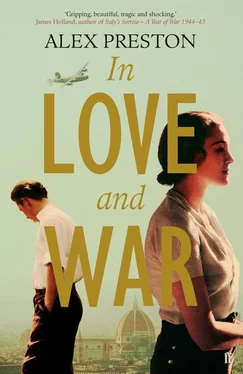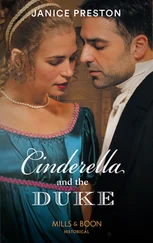Esmond had made several late-night trips to the church that last winter, a hat pushed down over his head, his breath misting in the sharp wild brace of the air. He’d pressed himself into ice-stiff bushes at the slightest sound, leapt garden walls, disappeared into the shadows of buildings where he watched Blackshirts garrulous and greasy after a night in a brothel on the via delle Terme. The curfew was loose, often ignored, but he couldn’t afford to be caught by the carabinieri and so he waited until the small hours before setting out. He came back loaded with books, jumpers, candles. He found Bailey’s service Webley in the priest’s bedside drawer, a Sam Browne belt of ammunition under the bed. He sleeps with the gun on the floor beside their mattress.
Finally, April — the trees shrugged of snow, the box-hedge parterre cutting shaggy lines through the whiteness. Only on distant peaks did snow still vein down. The town below woke with difficulty from winter. Petrol was increasingly scarce, food heavily rationed, the young men all away at war. Most of those who stepped out into the serene light of spring wished the snow and cold and darkness would come back. But the sun continued to shine and the city resumed life haltingly, stretching its stiff limbs.
That summer, they lived in the garden. The precise Italianate order at L’Ombrellino unravelled into wild profusion, geometric lines smudged and finally erased by fiercely sprouting fennel, fig, oleander, morning glory. The pool was dark with algae and frogspawn, knots of weed. Swallows threw themselves down over it to drink from the reflections of their beaks. Esmond imagined them flying up in a great dark wing over the desert where brave sunburnt soldiers stared across a landscape of dunes and mirages of the enemy. When summer ended, they’d swoop — on sudden instinct — southwards to the desert and the dying. The sand would be crossed with bones, dark blood, husks of tanks and troop-carriers. If the swallows knew anything at all, he thought, they’d weep as they passed over, or fly north, back into frozen whiteness.
Ada cut back the weeds on Alice Keppel’s vegetable garden. Soon they had tomatoes, zucchini, broad beans and radishes. She asked Bruno to bring her seeds and they planted carrots and celery, beetroot and cavolo nero . She worked with her hair in a gypsy bandana, an old shirt of Esmond’s hanging over her like a dress. Her hands became hard, the skin of her face dense with freckles. Before dinner they’d swim the dirt and heat of the day from their skinny bodies, lying naked, spreadeagled under the bruising sky.
Bruno and the Professor came more often in summer. Bruno would strip down to his undershorts — placing his matchstick atop his folded shirt — and swim slow lengths. The Professor removed his shoes and dangled his toes, leaning back against the pediment of one of the dodos and speaking with surprise about the destruction of Lübeck: the firestorm that had swept through the medieval city, sucking the oxygen from the air, unleashing tornadoes, turning people to ashes in seconds. He had become obsessed with the bombing raids. He’d started a scrapbook of press clippings, photographs, scholarly articles on the physical and psychological effects of the air war. Two hundred and fifty planes had dropped four hundred tonnes of explosives on the ancient Hanseatic port, he told them, the timbered buildings with their red-tiled roofs passing the flames from one house to the next with a roar. He looked down over Florence and was silent. Bruno’s path through the water, the birdsong in the trees below, wind in the pines and bamboo; he sighed and drew his long grey feet from the water.
Some evenings Esmond and Ada would raid the wardrobes of clothes the Keppels had left, opening bottles of spumante from the cellar and playing music — just softly — on the gramophone in the drawing room, pushing the divans and canapés and armchairs to the side. The discs were marching bands, Christmas carols, Vaughan Williams and Elgar, stolidly English. In one dusty record-case, Ada found three discs of Schubert waltzes. Esmond wore George’s white tie and tails, put a monocle in his eye and brilliantined his hair; Ada disappeared into Alice Keppel’s ball gowns, gathering up the trains and sweeping them around her à la flamenco. They’d jive and foxtrot to the faster numbers, working themselves into a sweaty muddle in the warm drawing room as daylight dwindled, then move in darkness to the slower music. Some evenings, birdsong in the hills was so loud that it drowned out the gramophone, and they’d find themselves dancing instead to a movement of larks and thrushes, finally falling onto the largest of the divans, panting and happy and lost.
She still has her moments of distance though, when she seems to leave him, to disappear into silence. She has the perfect cheekbones for such distance — high and horizontal, like Anna’s. Sometimes he despairs of ever knowing the rills and runnels of her heart. But love without torment, he reasons, is only friendship. They lie on their sky-high mattress, kiss, fuck; but it’s often as if there’s a film between them. One hot night, he’d stood with her in their bedroom and gripped her by the shoulders, shaking her gently. He was a little drunk and half-begged her, finally getting down on his knees.
‘Let me in. I want to know you. I can’t love you if I don’t know you.’
She’d smiled, faltering, then taken her wicker bag from the wardrobe and, looking directly at him, emptied it on the bed.
‘This is me,’ she said. ‘Look at it. This is me.’
Out fell a scallop purse, a diary, several pencils, a bottle of Yardley lavender water, a handkerchief, a blue-bound copy of Mayakovsky’s poems and a photograph of Esmond, taken by Goad last Christmas. She held the photograph out as if in triumph, as if to prove that he’d been fixed to the album of her life, and never again should he question her love.
They have talked, now and again, about the death camps. What started out as rumours were now facts: slatted railway carriages heading eastwards, humans herded like cattle, gas chambers. They listen to Radio Vaticana, which had first broken the news, and was now talking about German plans to exterminate the Jews of Europe. The Professor has been in touch with Ada’s father, who is in Milan, protected by Ettore Ovazza, safe so far. They can see the eggshell dome of the Great Synagogue from the terrace. Ada stands there some evenings, looking down, a shawl around her, until the light fades and the soft blue dome disappears into darkness.
The leaves are falling in the garden. They will need to be more careful when they step outside, although since the army extended the draft to those aged fifty — sometimes, in the right wind, they can hear the drafted Florentines marching for the war in Russia — they often feel quite alone in the world. L’Ombrellino is like a cloud palace, a vast Zeppelin hanging above an unpeopled city. There are bloodbaths in Greece and Yugoslavia and North Africa, the balance tilts — only slightly — to the Allies, and Esmond and Ada lie on their bed and listen to the radio, looking at the triptych, allowing the tortured figures to stand for what they cannot see, for the suffering that says to them both: it is time to engage.
The third of November, 1942: the day after they burnt In Love and War . Esmond is standing in uncertain morning light listening to birdsong rising around the villa. Tatters is at his feet, sniffing the air: damp leaves and woodsmoke. After so long spent in old, familiar clothes, he moves with difficulty in the uniform, which is too small for him. He couldn’t believe, when Bruno showed him the complicated layers of his disguise, that Italian soldiers still wore puttees, and had spent almost half an hour that morning wrapping and re-wrapping them around his calves. On his head is the red fez of the Bersagliere . The right sleeve of his tunic has been pinned behind his back. He thinks of his father.
Читать дальше












